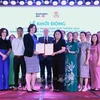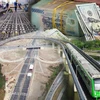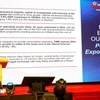Hanoi (VNA) - Violations of tax regulations are taking place in most localities, types of businesses and taxes. Meanwhile, tax inspection and tax examination according to the State Audit's evaluation is still missing many the enterprises’ mistakes.
Deputy General Auditor of the State Audit of Vietnam Doan Xuan Tien raised the issue at the seminar "Tax administration and the role of the State Audit" on May 9, in Hanoi.
Ineffective risk criteria?
According to the Deputy General Auditor, over the past time the tax sector has implemented administrative reform from tax registration to declaration, payment and refund.
However, he also frankly pointed that the amount of tax losses is still large, mainly because of tax evasion and tax fraud. "Tax evasion and tax fraud are becoming more complicated with wider scope , larger scale and increasingly sophisticated tricks," he said.
Assessing the tax inspection in the report sent to the seminar, Mr. Doan Anh Tho, Chief Auditor of the State Auditor Region IV said, most audited tax departments and tax divisions used supporting inspection and examination application to produce the results of risk analysis, as a basis for making inspection plans.
However, according to the assessment, the tax examination records at the headquarters of the tax authorities have the results of increased revenue, low tax assessment, most unchanged from the declared results. In addition, the number of businesses being inspected and checked accounts for a very low rate on the total number of operating enterprises.
A representative of the audit sector said that through the audited records, tax authorities have discovered many cases of increased revenue.
Since then, what he pointed out is that the system of risk criteria has not been really effective. One of the problems is that the data system does not identify the main business lines of the enterprise, leading to difficulties in analyzing, evaluating and comparing business results between enterprises in the same industry.
Are spreading tax incentives effective?
Regarding other contents, Nguyen Van Dat, Deputy Chief Auditor of the State Audit Sector II, pointed out that there are conditions that allow tax incentives in contravention of regulations. For example, exemption from corporate income tax in contravention of regulations or tax exemption at the end of the incentive period is not the right subjects eligible for incentives under investment certificates.
In addition, he also raised a series of current issues such as determining the taxable income that is not part of the reduced content, accounting for some improper expenses ... This leads to the reduction of business income tax not in accordance with regulations.
Regarding tax incentives, Mr. Tran Minh Khuong, Chief Auditor of the State Audit Office Region XIII summarized, every year the total amount of money that the State budget has provided incentives for businesses is equivalent to about 5.5-6 % of total budget revenue, of which tax incentives account for over 80%.
However, according to him, Vietnam's preferential tax policy has a quite wide and spreading preferential scope.
The representative of the State Audit of Vietnam cited the Investment Law of 2014 showing that the tax incentive policy applies to 30 investment incentive fields and 27 special investment incentive fields such as: high technology, information technology. information, supporting industries, electronics, mechanics, ...
He also said that the incentives are also applicable to areas with difficult socio-economic conditions in 53/63 provinces and cities and more than 300 hi-tech parks, economic zones, industrial parks and industrial parks and processing parks.
According to him, the incentive is too wide to lose the attractiveness of investment incentives. Not to mention, the tax incentive policy has contributed to creating opportunities for businesses to transfer prices to avoid taxes. Evidence is that many businesses established more subsidiaries and associates in areas with difficult and extremely difficult socio-economic conditions. Then, businesses apply price transfer tactics to transfer profits to these companies to enjoy low tax incentives.
Thus, he said, the investment incentive policy with actual tax rates is not very effective, but is reducing budget revenue.
Regarding the solutions, he mentioned the OECD's recommendation that it is necessary to reduce the application of tax exemption and reduction of term corporate income tax to switch to other more effective tax incentives./.





















